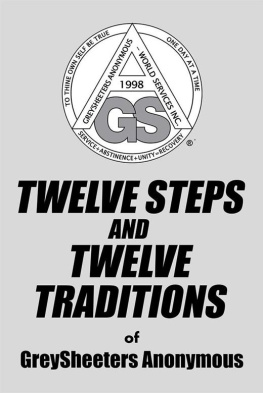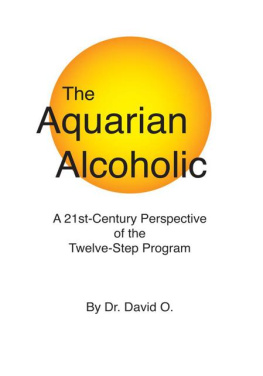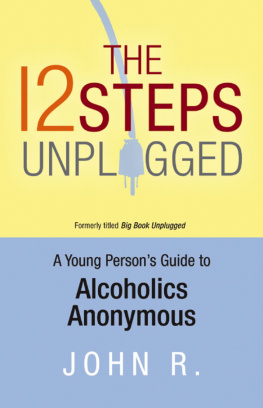

Barakaldo Books 2020, all rights reserved. No part of this publication may be reproduced, stored in a retrieval system or transmitted by any means, electrical, mechanical or otherwise without the written permission of the copyright holder.
Publishers Note
Although in most cases we have retained the Authors original spelling and grammar to authentically reproduce the work of the Author and the original intent of such material, some additional notes and clarifications have been added for the modern readers benefit.
We have also made every effort to include all maps and illustrations of the original edition the limitations of formatting do not allow of including larger maps, we will upload as many of these maps as possible.
THE LITTLE RED BOOK
The Original 1946 Edition
THE TWELVE STEPS
An Interpretation of
THE TWELVE STEPS
of the
ALCOHOLICS ANONYMOUS PROGRAM
Table of Contents
Contents
AUTHORS NOTE
This book was originally prepared as a series of notes for Twelve-step Discussion meetings for new A.A. members. It proved to be very effective and helpful. Many groups adopted it, using mimeographed copies. The demand for this interpretation in book form from both individuals and groups made printing advisable .
DEDICATION
This interpretation is sincerely dedicated to
BILL & DR. BOB
in appreciation of their tireless efforts and inspiration in making possible a WAY OF LIFE by which alcoholics everywhere can recover from alcoholism.
The endless thousands who have recovered from this disease and those who are yet to be helped will ever be indebted to the founders of ALCOHOLICS ANONYMOUS for the unselfish service they have rendered all alcoholics.
We believe our founders were inspired by a POWER GREATER THAN THEMSELVES as they pioneered the Alcoholics Anonymous movement, edited the book, Alcoholics Anonymous and exemplified the spiritual philosophy of this recovery program.
INTRODUCTION
This introduction to the Twelve Steps of the Alcoholics Anonymous program is humbly offered to all alcoholic men and women whose lives have become unmanageable because of their powerlessness over alcohol.
The purpose of the interpretation that follows is to help the newcomer in his study and application of the Twelve Steps of A.A. This interpretation is founded upon fundamental information taken from our book, Alcoholics Anonymous.
All supplementary matter is based on practical experience from the lives of fellow alcoholics who have found peace of mind and contented sobriety by a planned way of spiritual life set forth in the book, Alcoholics Anonymous.
The newcomer, too often, fails to realize the extent to which he is physically, mentally and spiritually ill, so through ignorance dwarfs parts of our program to suit his own distorted viewpoint.
It is obvious that much good can be accomplished by imparting to the new member the fund of knowledge which successful older members have gained by experience. The intent of this introduction and the object of this interpretation is toward that end.
The A.A. program by which we effect our recovery is extremely simple. It would need little interpretation in itself, except for the fact that it corrects a highly complicated disease which has lowered our physical resistance, distorted our thinking, and rendered us spiritually ill.
Few uncontrolled drinkers realize the danger of their position or the great extent to which the disease alcoholism can damage and deteriorate their minds and bodies. Few realize the full significance and effectiveness of our simple program without the help and cooperation of understanding members who have arrested their alcoholism.
A.A. has no connection with organized religion, medicine or psychology. It has drawn upon certain therapeutic virtues from them all, however, and has moulded them into a Design for Living that has returned us to sobriety and restored us to a place of service and respect in society.
The A.A. program is designed for uncontrolled drinkers who sincerely desire permanent sobriety and are willing to go to any lengths to get it. Men or women interested in temporary sobriety or in controlling their drinking are not ready for this program.
The ability to be honest is a most necessary requirement following the desire of the new member for rehabilitation. Willingness to get well, and belief in a POWER GREATER THAN OURSELVES to promote recovery, are essentials necessary to success.
Spiritual concepts must be embraced, but again we say they do not involve organized religion and although you must believe in this POWER yet it is your privilege to interpret it in accordance with your own understanding.
The alcoholics who have recovered through the Alcoholics Anonymous movement nationally disprove the age-old contention that all alcoholics are untrustworthy, and that they are destined to remain hopeless, drunken sots. Thousands upon thousands have disproved this, and hundreds of new alcoholics are daily proving that by living the A.A. philosophy, alcoholism can be arrested.
Permanent sobriety is the aim of the A.A. philosophy, but that in itself is not enough, for with it we must become contented, happy, responsible people.
The Twelve Steps of the A.A. program have provided us with a sound, proved means for recovery; we have yet to meet an alcoholic who, honestly desirous of arresting his alcoholism, and following the Twelve Steps as interpreted, did not recover.
It is true certain drinkers have not succeeded. A few of the reasons for their failures are listed.
1. Some sought our help to appease their wives, employers, judge, or to avoid impending evils that prolonged drinking develops. Theirs was a temporary problem. We have nothing to offer such people until they are definitely qualified as alcoholics and desire to stop drinking.
2. Those who have suffered brain injury from alcohol. (Symptomatic drinkers.)
3. Some failed because they were dope addictsthey drank, yes-but alcohol was not their basic problem.
4. Some were forced into the movement; they lacked sincerity, so did not last.
5. Some were heavy drinkers, but not alcoholics. They were not mentally or physically one of the seven in every one thousand adults who were abnormal reactors to alcohol.
6. The occasional atheist who is unwilling to accept the spiritual concept which underlies the A.A. program. (See Appendix 2 of A.A. book.)
7. The alcoholic who is constitutionally dishonest has no chance. He cannot be honest with himself.
8. Those who have not been harmed sufficiently by alcohol often fail because drinking is not a matter of life and death with them. This group generally involves the men and women with relatively short alcoholic histories.
9. Those who accept only a part of the Twelve-Step Program, who will not try to live it in its entirety. Those who wish to put a distorted, selfish interpretation on all of the steps for purposes of their own convenience.
The prospective member who falls under any of the groups listed, with the exception of group 8, has little chance of recovery.
Prospective members shown under group 8 need not be unduly alarmed if they are alcoholic and sincerely desire to recover. They can be as successful as any other member. They simply happen to be in a group that has had more difficulty than those in the more advanced ages. Their cue isbe on the alert.
Next page











